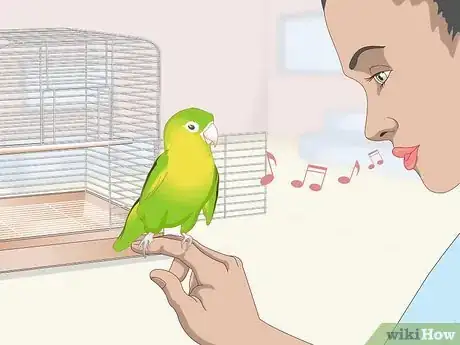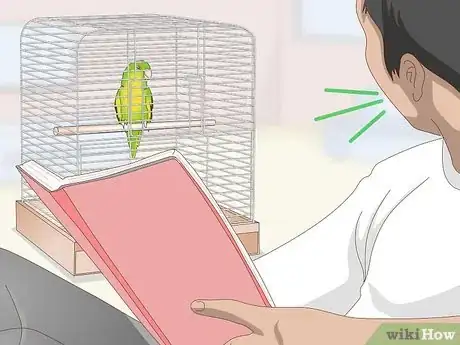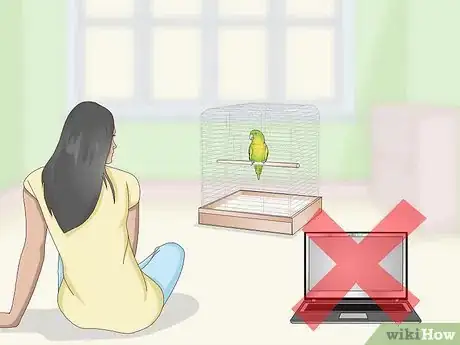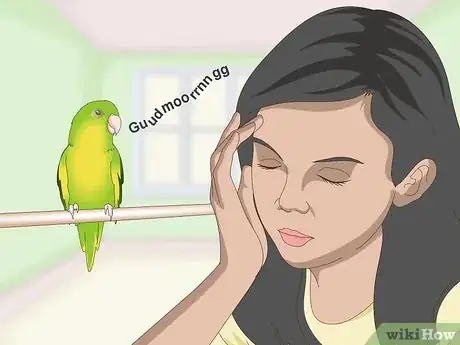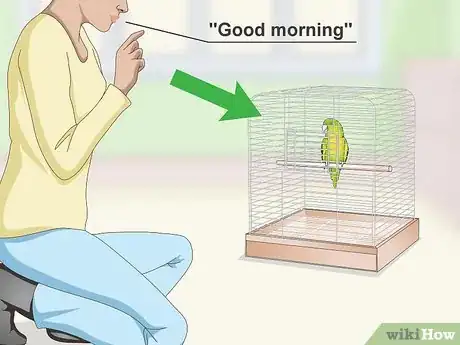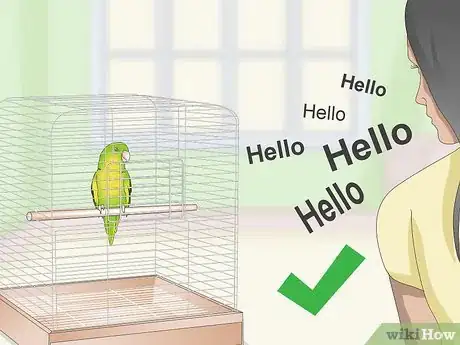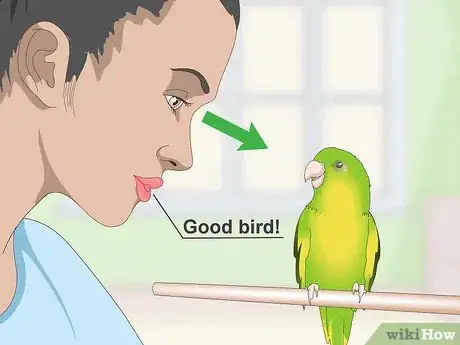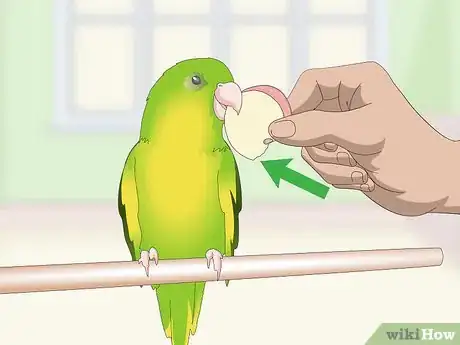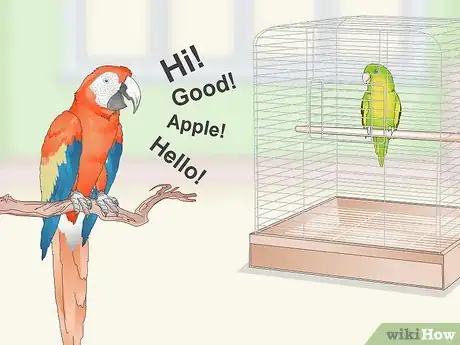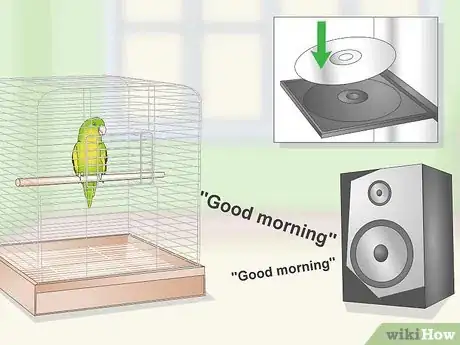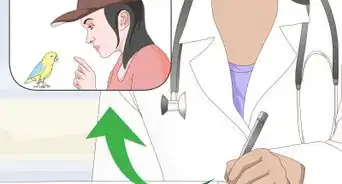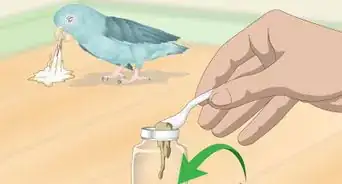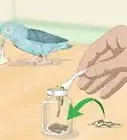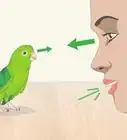This article was co-authored by Pippa Elliott, MRCVS. Dr. Elliott, BVMS, MRCVS is a veterinarian with over 30 years of experience in veterinary surgery and companion animal practice. She graduated from the University of Glasgow in 1987 with a degree in veterinary medicine and surgery. She has worked at the same animal clinic in her hometown for over 20 years.
This article has been viewed 17,479 times.
Parrotlets are the smallest parrot species, and make fun, energetic, and mischievous pet birds. They are quiet and have a pleasant chirp when they do speak.[1] You can teach parrotlets to talk, though they don’t talk as much as other breeds. To teach your parrotlet how to speak, build a good relationship with it, talk to it every chance you get, and practice often.
Steps
Creating the Right Environment
-
1Establish a strong relationship with your parrotlet. Happy, content birds who feel comfortable with their owner will be more willing to talk than parrots who are scared or lonely. Spend time with your parrotlet daily and speak to them often. Use a gentle, soothing tone so they don’t think you are angry or upset.[2]
- Sing and whistle to your bird. This will encourage them to talk and help build a relationship of trust between the two of you.
- Give the parrotlet treats and play with it using toys.
- If the parrotlet is new to your home, let it explore and become comfortable in its new environment.
-
2Train your bird consistently. To teach your parrotlet to speak, you have to be consistent with their training. Practice speaking with your bird every day. Speak or sing to your bird every time you are in the same room with them, and then schedule specific training times where you sit with your bird and teach them specific words and phrases.[3]
- Regular attention and vocal coaching will help reinforce your parrotlet’s speech. The more they are exposed to speaking, the better they will become.
- Ideally, you should train your bird every day. However, skipping a few days occasionally is okay.
Advertisement -
3Train your parrot in a calm environment. When you get ready to work with your parrott specifically on speaking, go to a calm area of your home. Tell other family members to leave the room and turn off all electronic devices. There should be no distractions so your bird’s attention is only on you.[4]
-
4Be patient. It will take time for your parrotlet to learn how to talk. They won’t be able to repeat the words on the first few tries, and they may babble or speak in unclear words for a while. That’s okay. Keep working with your bird and providing reward and eventually they will get there.[5]
- Parrotlets do not talk as much as other bird species. They have higher pitched voices that are not as easy to understand, but they can learn a few words and phrases.
- If your parrotlet was not exposed to talking at an early age, they may never pick up mimicking specific words.
Training Your Parrotlet
-
1Talk to the bird during every interaction. Parrotlets will learn words by imitating what you say. To help them learn the sounds of language, speak to them daily. When you walk past them, say “Hello,” “Good morning,” or “Good night.” Narrate your actions. Make sure to use full words and talk to them like an older child, not using baby talk.[6]
- When you give your bird items or food, name them. Say, “water,” “seed,” “toy,” “perch,” or “apple.”
-
2Emphasize words you want the bird to learn. The best way to get your bird to learn specific words is to say them over and over to your bird. Use an emphatic tone to get your bird’s attention and make the words exciting. Parrotlets will latch onto words they think sound exciting.[7]
- For example, if you want your parrotlet to learn “hello” or “grape,” try saying the words loudly and happily. You may also try saying the word in different ways or tones of voice to make the word more interesting.
- If you don’t want your parrotlet to curse, be careful cursing around them. Often, birds learn curse words because their owners emphatically and passionately shout curse words around them.
-
3Praise your parrotlet often. Praise is important during the training process. Praise positively reinforces the behavior and makes your bird happy. Parrotlets are social creatures and love getting attention from their owners. To praise your bird, look at them in the eye, and say, “Good job!” or “Good bird!”[8]
- Avoid praising unclear words or babble too enthusiastically. Give your parrotlet positive encouragement, but save your best praise for when they use clear words.
-
4Provide rewards for learning words. In addition to verbal praise, provide your parrotlet with treats to reward their behavior. When the bird tries to repeat a word or phrase, give them a treat. You may can touch or scratch them, give them a toy, or let them have a food treat.[9]
- Food treats should be saved for the best attempts at words or phrases. Give them a small amount, such as a single raisin or grape. Save their favorite treats for the best words.
-
5Place the parrot with other birds who talk. Bird don’t just learn how to talk from humans. They can also learn from other birds who talk. Placing them in cages or near other birds who already talk can teach them words and phrases.[10]
- Be aware that they may learn words you don’t want them to because of what the birds repeat.
-
6Use talking CDs. You can purchase CDs online or at a bird shop to play for your bird. Alternately, you can make an audio recording of yourself saying words you want your parrotlet to learn. Only play these recordings for them for around 20 minutes two times each day. Otherwise, you could make your bird bored with listening to the same things all the time.[11]
- You may try the TV or radio, but they don’t provide a repeated list of words, so your bird may not learn what you want them to learn.
References
- ↑ http://www.petuniversity.com/birds/parrots-and-parakeets/parrotlets.htm
- ↑ http://www.dummies.com/pets/birds/understanding-why-parrots-talk/
- ↑ https://www.beautyofbirds.com/talking.html
- ↑ http://www.2ndchance.info/parrottalk.htm
- ↑ http://www.2ndchance.info/parrottalk.htm
- ↑ https://be.chewy.com/10-tips-to-teach-your-pet-parrot-to-talk/
- ↑ https://be.chewy.com/10-tips-to-teach-your-pet-parrot-to-talk/
- ↑ http://www.dummies.com/pets/birds/understanding-why-parrots-talk/
- ↑ http://www.2ndchance.info/parrottalk.htm
About This Article
The best way to get your parrotlet to learn specific words is to say the words over and over to it, using an emphatic tone to get its attention and make the words exciting. For example, if you want it to learn “hello” or “grape,” try saying the words loudly and happily. Parrotlets are social creatures and love getting attention from their owners, so be sure to praise your bird every time it attempts to speak. Look at it in the eye and say, “Good job!” or “Good bird!” You should also give your parrotlet small food treats, like a single raisin or grape, but save these for only the best attempts at words or phrases. To make your training most effective, practice speaking with your bird every day, or as frequently as you can. For more tips from our Veterinary co-author, like how to use talking CDs to train your bird, keep reading!
